-
-
FeaturesคุณสมบัติPenyelesaianRecursosFiturCaracterísticas精选功能功能特點المزايا
-
Solutionsโซลูชั่นPenyelesaianSoluçõesSolusiSoluciones解决方案解決方案الحلول
-
IntegrationsการผสานรวมIntegrasiIntegraçõesIntegrationsIntegraciones集成整合服務دمج مع تطبيقات أخرى
-
Affiliate/Partnersพันธมิตร/พันธมิตรทรัพยากรAfiliasi/Rakan KongsiAfiliados/ParceirosAfiliasi/MitraAfiliados/Partners联盟/合作伙伴聯盟/合作夥伴شريك
-
ResourcesจองการสาธิตSumberRecursosSumber dayaRecursosالموارد資源中心

Unraveling the Secret of Sales Growth: WhatsApp for eCommerce
In the swiftly evolving landscape of online shopping, businesses are continually seeking new avenues to reach their target audience. The inception and rise of eCommerce have revolutionized the way we shop, offering unparalleled convenience and a plethora of choices at our fingertips. But as the digital market becomes more saturated, there emerges an undeniable need for brands to stand out, connect more personally, and serve customers instantaneously. This is where messaging apps, particularly WhatsApp for eCommerce, step into the limelight.
However, it’s not just about sheer user numbers. The essence of WhatsApp for eCommerce is the intimacy and immediacy it offers. Unlike traditional online stores or even social media platforms, WhatsApp paves the way for real-time, direct communication with customers. This level of engagement can lead to improved customer service, story-driven sales via WhatsApp statuses, and most importantly, it can help in forging a deeper trust with customers. Given the platform’s end-to-end encryption and stringent security features, customers often feel more at ease sharing their concerns or even making purchases.
As we delve deeper into this article, we’ll explore how WhatsApp for eCommerce can be the secret weapon for brands aiming for exponential sales growth. From the robust features of WhatsApp Business to tips on integrating this platform into your overall eCommerce strategy, we at Wati have got you covered.
WhatsApp for eCommerce: The Rising Dominance of WhatsApp in the Digital Space
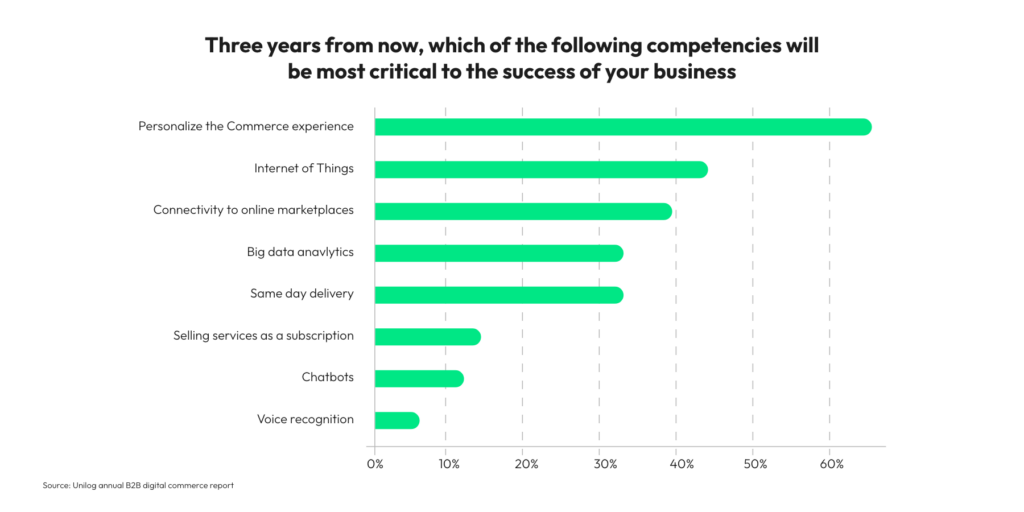
The digital age has ushered in numerous platforms aiming to revolutionize communication. Yet, among them, WhatsApp stands out, not just as a messaging tool but as a vital instrument for businesses. The potential of WhatsApp for eCommerce is now more significant than ever, and its rising dominance is hard to ignore.
From its humble beginnings to serving over 2 billion users worldwide, WhatsApp’s journey reflects its adaptability and relevance. This massive user base isn’t just communicating; they’re engaging, shopping, and influencing commerce. For brands venturing into the online retail world, integrating WhatsApp for eCommerce strategies is becoming less of an option and more of a necessity.
One feature that underscores WhatsApp’s effectiveness in the eCommerce space is its WhatsApp statuses. These statuses, often underestimated, provide businesses a non-intrusive medium to share updates, product launches, and promotional content. It’s a subtle yet potent way of integrating storytelling into WhatsApp for eCommerce, driving consumer interest and fostering brand loyalty.
Moreover, the unique selling point of WhatsApp lies in its ability to deliver a personalized shopping experience. Through features that allow businesses to send curated product suggestions, exclusive deals, or even real-time support, WhatsApp for eCommerce ensures each customer feels distinctly catered to. This direct engagement not only enhances the overall shopping journey but also solidifies a brand’s place in a customer’s mind.
The increasing significance of WhatsApp for eCommerce in the digital space is evident. Its blend of vast user reach, direct communication channels, and personalization capabilities makes it a frontrunner in the ever-evolving world of online commerce. Businesses that harness this potential are poised for growth, setting them apart from the competition.

Why WhatsApp for eCommerce?
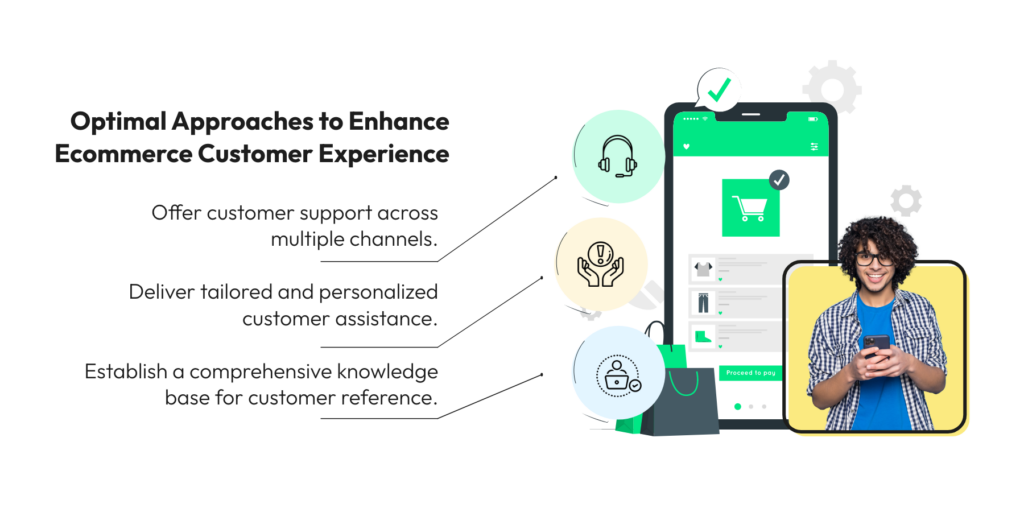
Navigating the vast realm of online business strategies can be daunting. Amidst myriad platforms and tools available, making the right choice is paramount. This brings us to an essential question: Why choose WhatsApp for eCommerce? The answer, as we’ve witnessed at Wati, is manifold, encompassing aspects like immediacy, trust, and a truly personalized experience.
1. Direct and Immediate Communication with Customers
In the fast-paced world of online shopping, time is of the essence. Customers today demand immediate answers and swift solutions. WhatsApp for eCommerce capitalizes on this need by enabling direct customer communication. Unlike traditional email or even some messaging platforms, which might involve delays or automated bots, WhatsApp facilitates real-time human interactions. This speed and directness often translate to increased customer satisfaction and higher conversion rates.
2. Enhanced Customer Service Possibilities
With WhatsApp for eCommerce, gone are the days of long wait times on customer service hotlines or sifting through cluttered email inboxes. The platform provides a streamlined channel for addressing queries, resolving issues, and even processing returns or exchanges. At Wati, we’ve noticed a trend: businesses that leverage WhatsApp for customer service often report enhanced customer loyalty and repeated sales.
3. Story-driven Sales through WhatsApp Statuses
The beauty of WhatsApp statuses lies in their ability to craft compelling narratives without seeming intrusive. For brands, this means an opportunity to showcase products, share testimonials, or announce limited-time offers. Such storytelling methods embedded in WhatsApp for eCommerce not only foster brand visibility but also drive consumer engagement in a more organic manner.
4. Trust Factor: End-to-End Encryption and Security Features
One of the chief concerns for online shoppers today is data security. Here, WhatsApp shines with its robust end-to-end encryption, ensuring that all communications remain confidential. By choosing WhatsApp for eCommerce, businesses send a clear message to their customers: their privacy is paramount. Such assurances inevitably lead to greater trust, a cornerstone for any successful online venture.
5. Potential for Personalizing the Shopping Experience
Lastly, the magic of WhatsApp for eCommerce is truly realized when businesses harness its capabilities to offer a personalized shopping experience. Be it sending curated product lists, giving exclusive sneak peeks, or even providing tailored shopping advice, WhatsApp enables brands to make every customer feel special. This level of customization, as we’ve observed at Wati, often results in increased sales and long-term brand loyalty.
In essence, while there are myriad tools and platforms available to online retailers, the unique amalgamation of directness, storytelling, security, and personalization that WhatsApp offers makes it a standout choice. As the digital market evolves, WhatsApp for eCommerce remains a consistent and influential force, driving sales and shaping customer experiences.

WhatsApp for eCommerce: A Game Changer for Online Retailers
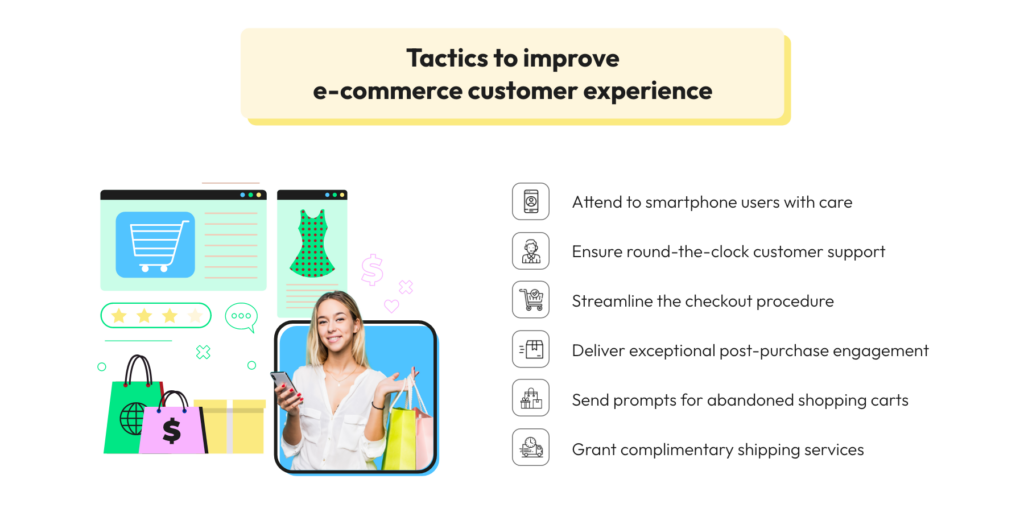
The world of online retailing is teeming with tools and platforms, each vying for a slice of the eCommerce pie. However, standing tall amidst these myriad options is WhatsApp Business, a specialized variant of the beloved messaging app. Designed with businesses in mind, this platform amplifies the core principles of WhatsApp for eCommerce, streamlining operations and enriching customer interactions.
Features of WhatsApp Business
WhatsApp Business isn’t just a regular messaging app with a business tag; it’s equipped with tools tailor-made for commercial endeavors. One of the key features is the ‘Business Profile’, allowing retailers to furnish essential information such as operating hours, location, and contact details, thus offering a snapshot of their enterprise at a glance. Additionally, ‘Quick Replies’ enable businesses to craft and store responses for frequently asked questions, ensuring timely and consistent communication.
At Wati, we’ve often emphasized the importance of analytics, and WhatsApp Business doesn’t disappoint. The built-in ‘Messaging Statistics’ offers insights into metrics like message delivery, open rates, and responses, providing a pulse on customer engagement and areas for improvement.
Catalog Feature: Showcasing Products Directly on the Platform
A standout feature in the realm of WhatsApp for eCommerce is the ‘Catalog’. Rather than redirecting customers to external websites or apps, businesses can showcase their products or services directly within WhatsApp. This not only reduces friction in the shopping journey but also ensures a smoother, more integrated experience. Paired with the potential for personalized shopping experiences, where businesses can suggest specific catalog items based on user preferences or past interactions, the catalog feature is nothing short of revolutionary.
Automated Responses for Streamlined Customer Interaction
In today’s digital age, immediacy is key. Recognizing this, WhatsApp Business offers ‘Automated Responses’. Be it greeting a potential customer, confirming an order, or addressing common queries, automated messages ensure that the direct customer communication ethos of WhatsApp for eCommerce is maintained even during off-hours or high traffic periods.
In wrapping up, WhatsApp Business is not just a tool; it’s a transformative force in the landscape of online retailing. With its unique features and customer-centric approach, it empowers businesses to harness the full potential of WhatsApp for eCommerce. As the digital marketplace evolves, those adept at leveraging WhatsApp Business are poised to lead the charge, setting new standards in customer engagement and sales growth.
Integrating WhatsApp with Your eCommerce Strategy
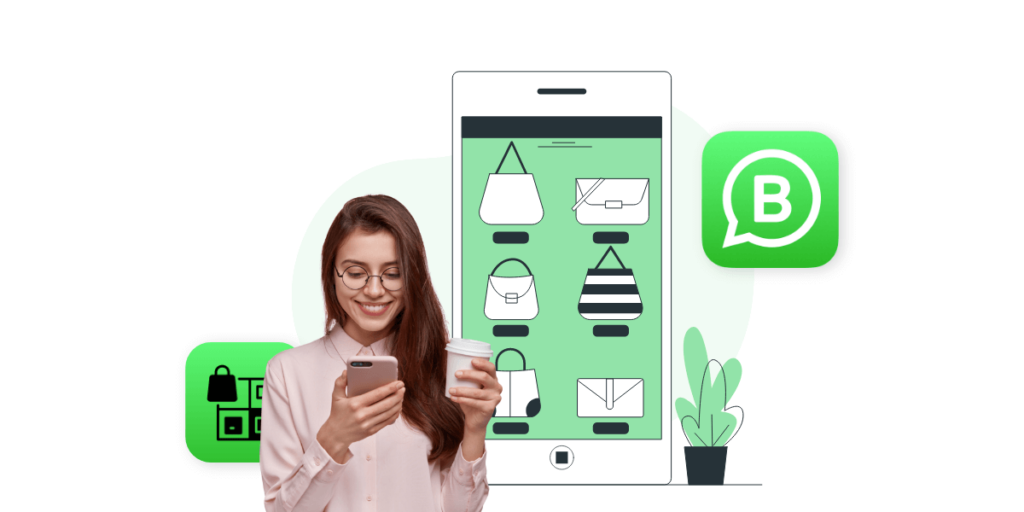
In today’s hyper-digitalized era, merely having an online presence isn’t enough. eCommerce brands need to be proactive, agile, and customer-centric. With the myriad tools available, the integration of WhatsApp for eCommerce can significantly elevate a brand’s digital strategy, offering both efficiency and intimacy in customer interactions. Drawing from our expertise at Wati, let’s delve into the nuances of melding WhatsApp seamlessly into your eCommerce game plan.
Setting Up Your WhatsApp Business Account
Before diving deep, the first step is to establish a solid foundation. Create a WhatsApp Business account distinct from your personal one. This separation ensures professionalism and aids in organization. Populate your business profile with essential details—brand story, contact information, operating hours—to give potential customers a clear snapshot of your enterprise.
Effective Utilization of Broadcasting and Labeling Features
One of the standout features in WhatsApp for eCommerce is the ‘Broadcasting’ function. Unlike standard group messages, broadcasts allow you to send personalized messages to selected contacts without them seeing each other. This feature is invaluable for sharing promotions, new arrivals, or exclusive offers.
Couple this with ‘Labeling’, a feature that enables categorization of chats (e.g., ‘New Customer’, ‘Pending Payment’). This helps streamline follow-ups, manage customer relationships, and ensure no query or transaction falls through the cracks.
Building and Managing Customer Lists
Harnessing the power of WhatsApp for eCommerce is intricately tied to how you manage your customer lists. Regularly update and segment your lists based on purchase history, interaction frequency, or even preferences. Such segmentation aids in delivering more tailored and personalized shopping experiences.
Crafting Engaging and Actionable Messages
Being direct doesn’t mean being bland. Messages, especially those utilizing WhatsApp statuses, should be crafted to engage, inform, and prompt action. Whether it’s a limited-time discount, a product launch, or just a brand update, your content should resonate with your audience, driving both interest and conversions.
Collecting Feedback and Reviews
Feedback is the cornerstone of continuous improvement. Use WhatsApp for eCommerce to solicit reviews post-purchase or after resolving a query. Such direct feedback mechanisms not only provide insights into areas of improvement but also foster a sense of community and trust among your customers.
In summation, integrating WhatsApp into your eCommerce strategy isn’t just about leveraging a popular platform; it’s about capitalizing on direct, immediate, and personalized communication channels. As the landscape of online retail becomes increasingly competitive, the brands that truly harness the potential of WhatsApp for eCommerce are set to differentiate themselves, offering unparalleled customer experiences and driving consistent growth.
Challenges & Considerations for Using WhatsApp in eCommerce
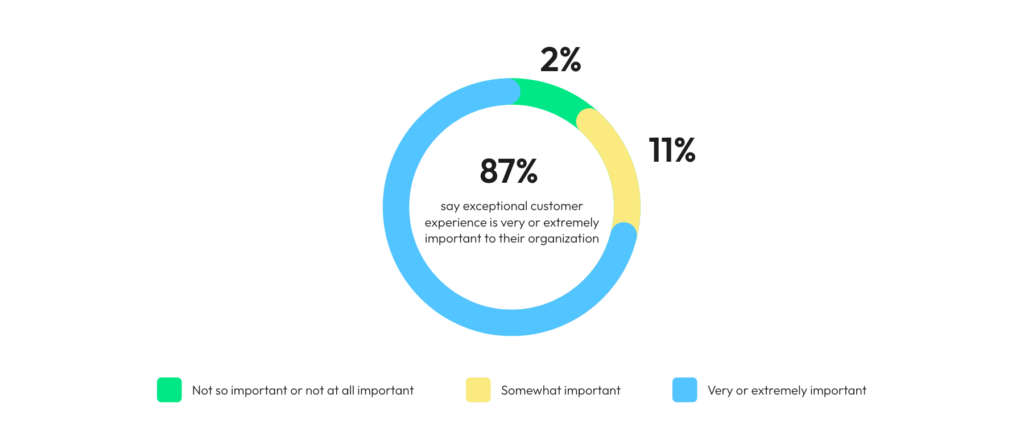
While the integration of WhatsApp for eCommerce presents a myriad of advantages, it’s crucial to approach this avenue with a balanced perspective. Like all tools, WhatsApp has its challenges and considerations that businesses should be aware of. At Wati, our deep dive into the platform’s intricacies has illuminated some key areas that online retailers need to navigate wisely.
Data Privacy Concerns
In an era where data privacy is paramount, businesses need to be acutely aware of how they handle and store customer information. While WhatsApp boasts end-to-end encryption, ensuring secure communication, brands must ensure they do not misuse the platform to extract or store customer data without explicit consent. Leveraging WhatsApp for eCommerce means walking the fine line of personalized communication while respecting user privacy.
Handling a Large Volume of Messages
The allure of direct customer communication means that businesses might get inundated with messages. From queries and feedback to orders and complaints, the influx can be overwhelming. Without proper organization, response protocols, and perhaps even dedicated personnel, there’s a risk of missing out on crucial interactions or delaying responses.
Potential Over-Reliance on a Single Platform
Diversification is a golden rule in business. While the potentials of WhatsApp for eCommerce are undeniable, brands should avoid putting all their eggs in one basket. It’s essential to maintain a multi-channel approach, ensuring that if one platform faces issues or changes its policies, the business doesn’t suffer disproportionately.
Customer Perception and Expectation Management
Given the personal nature of WhatsApp, some customers might have heightened expectations regarding response times or the kind of support they should receive. Managing these expectations, setting clear guidelines on response times, and ensuring consistent quality in interactions are paramount.
The journey of leveraging WhatsApp for eCommerce is not without its bumps. However, with careful consideration, strategic planning, and by staying attuned to the platform’s evolving landscape, businesses can mitigate challenges and extract maximum value. At Wati, our emphasis has always been on holistic strategies, ensuring that while we harness the power of tools like WhatsApp, we’re always prepared, adaptive, and customer-centric.
WhatsApp Templates for eCommerce: Enhancing Customer Interactions
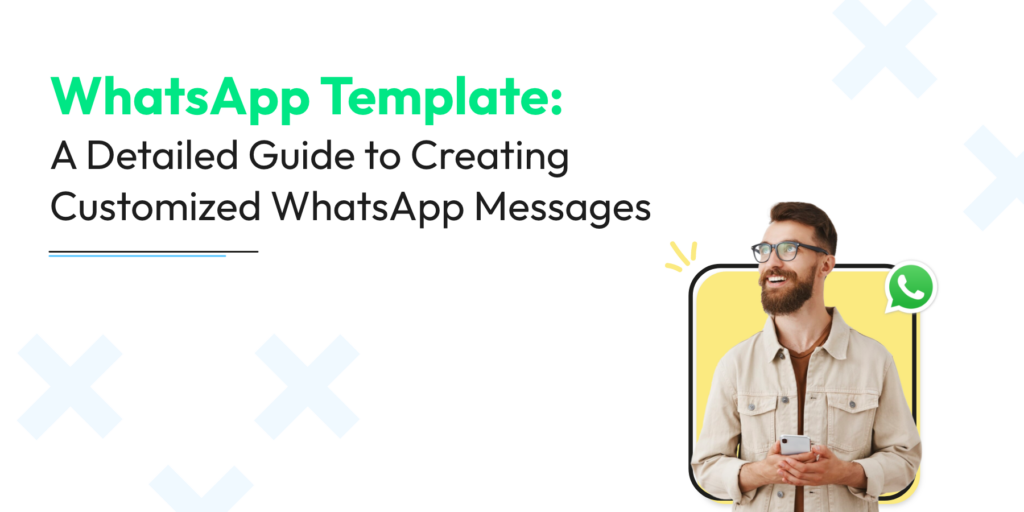
In the dynamic realm of online shopping, communication is paramount. While the versatility of WhatsApp as a messaging platform is universally acknowledged, its efficacy in the eCommerce sector is often accentuated by the judicious use of templates. These pre-defined message formats are not just time-savers but ensure consistency, clarity, and professionalism in brand communication. At Wati, we’ve witnessed firsthand the transformative impact of well-crafted WhatsApp templates on WhatsApp for eCommerce strategies. Let’s delve deeper into their significance, followed by some exemplary templates tailored for online retailers.
The beauty of WhatsApp templates for messaging apps in eCommerce is their adaptability. Be it order confirmations, shipping notifications, or promotional announcements, templates can be customized to fit a multitude of scenarios, ensuring direct customer communication remains streamlined and effective.
WhatsApp Template Examples for eCommerce:
| Purpose | Template |
|---|---|
| Order Confirmation | “Hello [Customer Name], your order #[Order Number] has been confirmed! Expected delivery: [Date]. Thank you for shopping with us!” |
| Shipping Notification | “Good news, [Customer Name]! Your order #[Order Number] is on its way. Track your shipment here: [Tracking Link].” |
| Feedback Request | “Hey [Customer Name], we hope you loved your recent purchase! Could you spare a moment to share your feedback? [Feedback Link]” |
| Promotional Offer | “Exclusive for you, [Customer Name]! Get [Discount]% off on our new collection. Shop now and elevate your style: [Shop Link].” |
| Customer Support | “Hello [Customer Name], we’re here to help. Please let us know your query or concern, and our team will assist you shortly.” |
| Restock Notification | “Guess what, [Customer Name]? Your favorite [Product Name] is back in stock! Grab yours now: [Product Link].” |
Incorporating these templates into your WhatsApp for eCommerce strategy can significantly elevate customer interactions, ensuring clarity, consistency, and a touch of personalization. Remember, it’s not just about sending a message; it’s about making an impact, resonating with your audience, and fostering connections that drive brand loyalty and growth.
In conclusion, as eCommerce brands strive to carve their niche in the digital landscape, tools like WhatsApp templates offer a competitive edge. At Wati, we champion the power of effective communication, and these templates, with their blend of consistency and customization, epitomize this philosophy in the realm of WhatsApp for eCommerce.
Future of WhatsApp in eCommerce
The digital realm is in a state of perpetual evolution, with platforms adapting, innovating, and often setting new paradigms. As WhatsApp for eCommerce continues to solidify its foothold in the online retailing landscape, one cannot help but ponder: What does the future hold? Drawing from our insights at Wati and tracking emerging trends, let’s embark on a speculative journey into the foreseeable future of WhatsApp’s role in eCommerce.
Anticipated Features and Updates
The developmental trajectory of WhatsApp, especially its business variant, has been impressive. As they tap deeper into the messaging apps in eCommerce market, we can anticipate a slew of features catering specifically to online retailers. Enhanced analytics, more refined audience segmentation, and perhaps even in-app payment integrations might soon be on the horizon, streamlining the WhatsApp for eCommerce experience further.
Expansion into Transactional Capabilities
The current model of WhatsApp allows for showcasing products and engaging with customers. However, direct transactional capabilities, where users can make purchases without leaving the app, could be a game-changer. By integrating secure payment gateways and offering a seamless checkout process, WhatsApp can further engrain itself in the eCommerce ecosystem.
Integration with Other Marketing Platforms and Tools
To provide a holistic and integrated digital strategy, we foresee WhatsApp broadening its collaboration horizons. Partnerships with popular CRM systems, marketing automation tools, or even other social media platforms could amplify the WhatsApp for eCommerce strategy, ensuring consistent messaging and enhanced customer journey mapping.
Greater Automation with a Personal Touch
While automation is already a part of the WhatsApp Business toolkit, the future might witness a blend of advanced AI-driven chatbots combined with human interactions. This hybrid model ensures that while common queries are addressed instantly, more complex interactions still have the personal touch, upholding the ethos of direct customer communication.
In essence, while the present implications of WhatsApp for eCommerce are profound, the future seems even more promising. The fusion of technology, personalization, and direct communication is poised to reshape the contours of online retailing. At Wati, we remain committed to staying at the forefront of these changes, ensuring businesses not only adapt but thrive in this evolving digital marketplace.
The Role of Wati in Enhancing WhatsApp for eCommerce
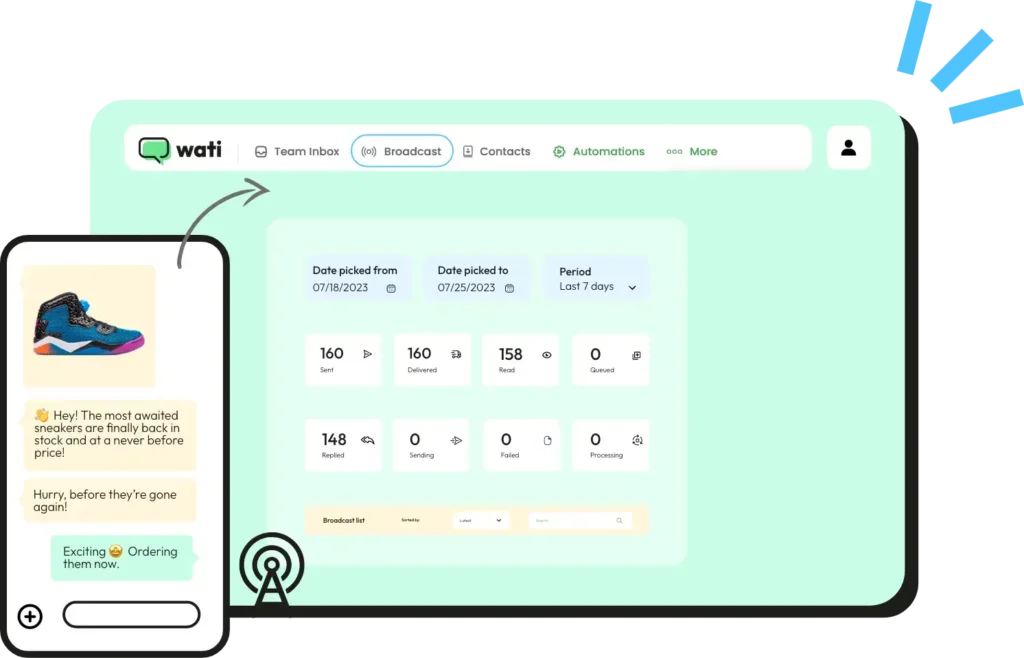
Navigating the bustling corridors of the digital marketplace demands innovation, agility, and a keen sense of customer needs. As we’ve journeyed through the multifaceted realm of WhatsApp for eCommerce, it’s evident that this platform isn’t merely another tool in the arsenal of online retailers. Instead, it’s poised to be a cornerstone, reshaping interactions, engagements, and sales dynamics.
The essence of WhatsApp for eCommerce lies in its synthesis of mass reach with intimate, personalized interactions. Through features ranging from product catalog showcases to real-time, direct customer communication, WhatsApp has created a conduit that binds businesses and customers in a unique dance. It’s a dance of trust, facilitated by robust security features, and one of shared stories, illuminated via engaging WhatsApp statuses.
Looking forward, the horizon of WhatsApp for eCommerce gleams with potential. From anticipated features to a deeper fusion with emerging technologies like AR and VR, the canvas is vast and inviting. Yet, amid these technological prospects, the core principle remains unchanged: customer-centricity. At Wati, our philosophy is rooted in this principle. We believe that while tools and technologies may evolve, the heart of eCommerce lies in genuine, impactful interactions.
In wrapping up, as brands venture forth, charting their paths in the digital marketplace, integrating WhatsApp for eCommerce is not just an option; it’s a strategic imperative. It’s a bridge to the future, anchored in the time-tested values of direct communication, trust, and personalized engagement.
Frequently Asked Questions (FAQs)
How can WhatsApp for eCommerce enhance customer engagement?
WhatsApp provides a direct communication channel for businesses to connect with their customers in real-time, offering personalized responses and instant support. Through features like broadcasting and WhatsApp statuses, brands can promote their products, announce sales, and share updates, fostering a deeper connection with their audience.
Wati can help: At Wati, we specialize in streamlining your WhatsApp engagement strategies, ensuring your messages resonate with your target audience and drive enhanced interactions.
How secure is using WhatsApp for eCommerce transactions?
WhatsApp employs end-to-end encryption, ensuring that all messages, calls, photos, and videos shared are secure and can only be accessed by the sender and the recipient. This level of security can make customers more comfortable interacting with brands and sharing sensitive information.
Wati can help: At Wati, we prioritize your business’s security and your customers’ trust. We offer guidance on best practices for maintaining privacy and security while harnessing the power of WhatsApp for eCommerce.
Can WhatsApp integrate with other eCommerce platforms and tools?
Yes, with the right tools and plugins, WhatsApp can be integrated into various eCommerce platforms like Shopify, WooCommerce, and Magento. Such integrations can automate processes like sending order confirmations, tracking updates, and promotional messages.
Wati can help: Wati’s expertise extends to integrating WhatsApp seamlessly with your existing eCommerce systems, enhancing efficiency and ensuring a cohesive user experience.
How do personalized shopping experiences on WhatsApp drive sales?
Personalization is a key driver in today’s eCommerce landscape. When businesses use WhatsApp to send tailored product recommendations, exclusive offers, or personalized messages based on a customer’s shopping behavior, it makes the customer feel valued, leading to increased trust, loyalty, and higher chances of sales.
Wati can help: At Wati, we understand the nuances of crafting personalized messages that hit the mark. With our insights, you can elevate the personalized shopping experience on WhatsApp, driving both engagement and conversions.
Latest Comments